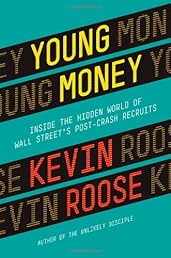
|
Price: $16.95 ( (as of 2014-02-24 20:00:40 PST) You save $10.05 (37%)
(as of 2014-02-24 20:00:40 PST) |
DescriptionBecoming a young Wall Street banker is like pledging the world's most lucrative and soul-crushing fraternity. Every year, thousands of eager college graduates are hired by the world's financial giants, where they're taught the secrets of making obscene amounts of money-- as well as how to dress, talk, date, drink, and schmooze like real financiers.YOUNG MONEY Inside the Hidden World of Wall Street's Post-Crash Recruits YOUNG MONEY is the inside story of this well-guarded world. Kevin Roose, New York magazine business writer and author of the critically acclaimed The Unlikely Disciple, spent more than three years shadowing eight entry-level workers at Goldman Sachs, Bank of America Merrill Lynch, and other leading investment firms. Roose chronicled their triumphs and disappointments, their million-dollar trades and runaway Excel spreadsheets, and got an unprecedented (and unauthorized) glimpse of the financial world's initiation process. Roose's young bankers are exposed to the exhausting workloads, huge bonuses, and recreational drugs that have always characterized Wall Street life. But they experience something new, too: an industry forever changed by the massive financial collapse of 2008. And as they get their Wall Street educations, they face hard questions about morality, prestige, and the value of their work. YOUNG MONEY is more than an exposé of excess; it's the story of how the financial crisis changed a generation-and remade Wall Street from the bottom up.
Editoral ReviewAn Amazon Best Book of the Month, February 2014: If Martin Scorsese's film The Wolf of Wall Street is about the finance industry's greediest adults, Kevin Roose's Young Money: Inside the Hidden World of Wall Street's Post-crash Recruits is a look at those wolves as cubs. The book is a surprisingly sympathetic portrait of the kids starting at Goldman Sachs, Merrill Lynch, and Credit Suisse (it's less sympathetic toward their bosses, who come across like shameless versions of the parents in Peanuts comics). These young bankers and analysts discover that while the pay is good, the hours are bad and the never-ending sense of existential dread is ugly. But perhaps the great irony of the crash of 2008 is that even as it eroded the industry's reputation in the minds of college students, the job market it decimated left those graduates very few employment options. Despite their hesitations, many scared twentysomethings entered the finance sector, as one of the few institutions that was still hiring. Roose suspects that banks attract "confused, insecure college seniors, who are smart and capable in a general, all-purpose way, but aren't phenomenally talented at any one thing." Most of the eight workers Roose follows end up burning out or quitting; the ones who succeed and stay in finance--you feel the worst for them. --Kevin Nguyen
|
||||||||||||||||||||
Become a fan of Book Presence on Facebook for the inside scoop on latest and most exclusive books.





